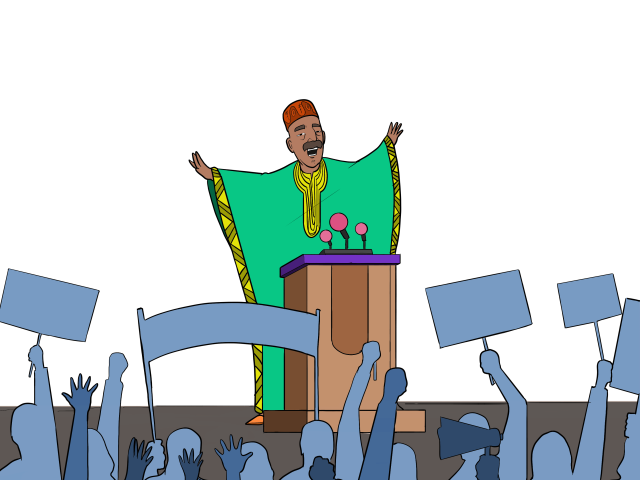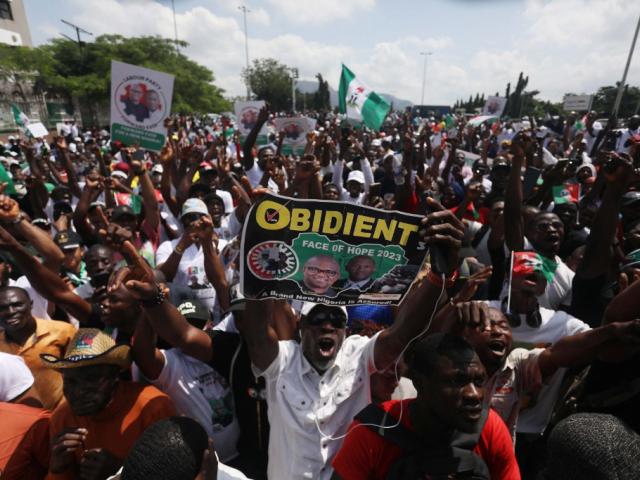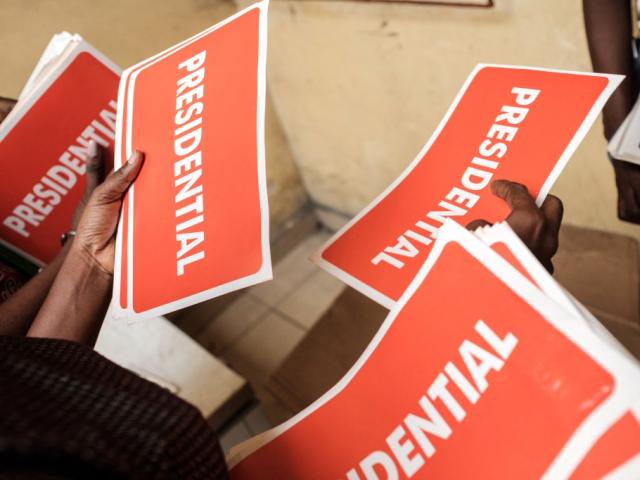Nigerians will go to the polls on Saturday 25 February 2023 to elect their next president and federal lawmakers.
Two weeks later, on 11 March, Nigerians will vote for governors in 28 states and members of the state houses of assembly, according to a timetable published by the Independent National Electoral Commission (Inec).
This is the seventh general election since the country's return to democracy in 1999, and one of the most hotly contested. For the first time, there are four main contenders for the presidency.
Since the start of campaigning in September 2022, the political battles have been fierce, mostly centred on the presidential election. The different political camps have also used disinformation in abundance.
This shows no sign of abating. It is highly likely that false and misleading information will still be used to push narratives even after the winners have been declared.
Given Africa Check's experience fact-checking the 2019 general elections and the trends we've seen so far, we've identified eight types of disinformation Nigerians are likely to see on election day.
These types of disinformation are likely to circulate on Twitter, Facebook, WhatsApp and other social media platforms as politicians make last-ditch attempts to sway voters.
Claims that one candidate has stepped down for another: It can be disruptive to learn on election day that the candidate you were planning to vote for has stepped down or withdrawn from the race. It could discourage voters from going to the polls. There were instances of candidates stepping down in favour of other candidates during the 2019 election. But there are recent cases where news of a candidate stepping down have turned out to be false. The Labour Party’s presidential candidate, Peter Obi, had to deny rumours that he was withdrawing. The presidential candidate of the New Nigeria Peoples Party, Rabiu Kwankwaso, did the same. Such rumours are likely to resurface on election day.
Fake endorsements: We have previously identified fake endorsements as one of the disinformation trends around Nigeria’s 2023 elections. There have been several instances where false information has been circulated about a prominent figure endorsing a candidate. If news of such endorsements spreads a day or two before the election, or on election day, it could sway some voters. In 2019, we debunked a false claim that former president Olusegun Obasanjo had endorsed president Muhammadu Buhari’s re-election bid. It started circulating two days before the election and was still going strong on social media on election day.
Photos and videos of violence that are fake or taken out of context: Studies have shown that rumours of violence on election day affect voter turnout. Photos and videos of violence from previous elections or unrelated events are likely to circulate on election day and discourage some voters.
False news about the use of the bimodal voter accreditation system (BVAS): The BVAS will be used for the first time in a general election in 2023, just as card readers were used for the first time in 2015. The system has attracted a lot of interest in the run up to this election. Some politicians have argued that Nigeria is not ready for technologies like BVAS during elections. As with card readers in 2015, it is likely there will be false and misleading claims about the BVAS malfunctioning or being used selectively.
False reports of people voting without voter cards in certain polling stations: The electoral commission has insisted that no one will be able to vote without presenting their permanent voter card (PVC). There are likely to be false allegations that Inec has allowed certain people or ethnic groups in some parts of the country to vote without the card.
False news related to existing narratives about leading candidates: All the presidential election frontrunners have been the subject of false or misleading claims about their ethnicity, religion, personality or health. For example, on the morning of the 2019 presidential election, a doctored photo circulated claiming that Buhari of the All Progressives Congress (APC) had mistakenly voted for the opposition Peoples Democratic Party (PDP). The original photo was of him voting in 2015. That was meant to reinforce the narrative that Buhari was not mentally fit to be president, and may have influenced some voters.
Photos and videos with allegations of vote buying: Incidents of politicians offering cash to voters on election day, known as vote buying, have been reported in recent state elections. Old photos and videos of vote-buying from previous elections are likely to be circulated during this election. This is even more likely because of the currency crisis Nigeria is facing due to the redesign of some naira notes and the introduction of a cashless policy.
Fake election results or results from previous elections: Unofficial results usually circulate before the electoral commission has finished counting the votes and declared a winner. Some may be from previous elections. Some of the fake results may be attributed to Inec and made to look credible.
How to tackle false information on election day
Here are easy ways to check that the information you receive on election day is accurate.
- The first step is to stop and think about it. Ask yourself these five questions about the information you have received:
- Who wrote it?
- Can I verify the claims?
- Does the information make me feel happy, scared or angry?
- Does it contain shocking pictures, video or audio?
- Am I sure it’s not a hoax?
Answering these questions critically will help you avoid sharing false information.
- For information about major events, leading candidates and endorsements, simply type the keywords from the claim into Google or any other reliable search engine to see if credible news organisations have published it either on their websites or verified social media handles.
- For photos, a reverse image search using Google images, Tineye or Yandex will show you where else online the image has previously appeared. For videos, use the Invid verification plugin. How do you perform a reverse image search? Follow these simple steps:
- Download or save the image you want to check. You can also copy the web address of the image you want to verify (but make sure it is the URL of the actual photo and not the entire web page).
- Visit https://images.google.com.
- Go to your browser’s menu, scroll down and select "Request Desktop Site". In Google Chrome, you can see the menu by pressing the three dots at the top right of the screen. In iOS Safari, it's at the bottom left of the screen.
- Press the camera icon in the search bar.
- There are two options: Paste the URL of the photo you want to check in the search bar. Alternatively, select the “upload an image” tab to upload the image from where you’ve saved it on your phone or computer.
- Check the results to see when and where else the image was used. If you go back far enough, you will probably find where it was originally used and possibly the copyright owner.
- For election results, remember that only election results announced by Inec are authentic. Check Inec’s official website and its official social media handles. Also follow credible media organisations covering the elections.
- Send it to Africa Check to verify. We will be working with other fact-checkers on election day to debunk false and misleading information about the election.
- Search online to see if the message you have received has already been fact-checked or reported as a hoax. Visit our website africacheck.org to confirm. You can ask us to help fact-check a message by contacting us on WhatsApp on +2349083777789. You can follow us or message us on Twitter (@AfricaCheck_NG), Facebook (@AfricaCheckNG) and Instagram on @africacheck_ng.





Add new comment